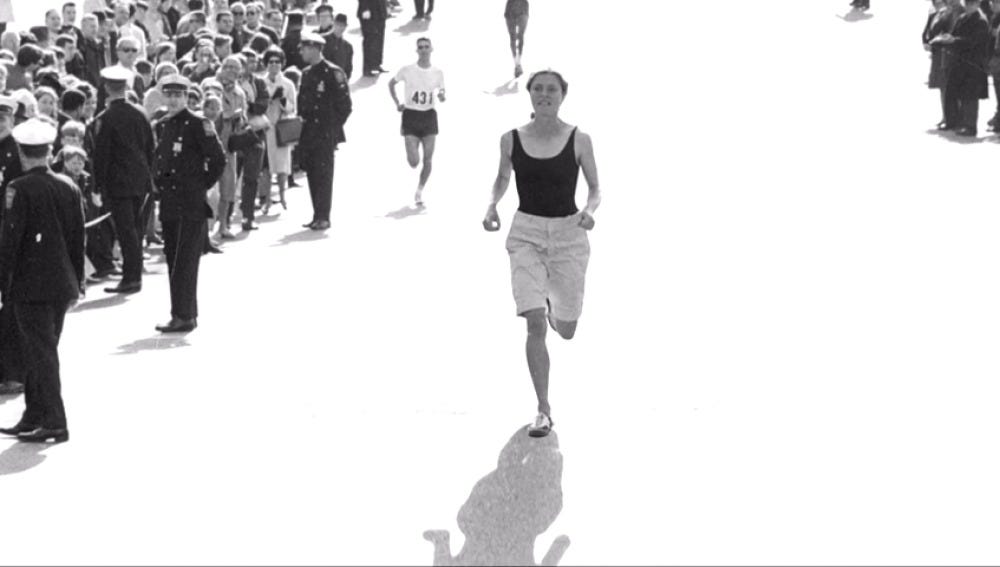What happens to a dream deferred?
Does it dry up
like a raisin in the sun?
Or fester like a sore—
And then run?
Does it stink like rotten meat?
Or crust and sugar over—
like a syrupy sweet?
Maybe it just sags
like a heavy load.
Or does it explode?
— Langston Hughes, Harlem
For a long time, I was a serial monogamist when it came to reading. I’d read a book from start to finish and when I was done, I was done. I never looked back.
Lately, though, I’ve found myself returning to books I’ve read in years past, going back to pages and sentences I underlined the first time I read them, pulled back by a sense they have something more to teach me.
That’s why I’ve found myself going back to Maggie Mertens’s Better, Faster, Farther, a book she published last year on how running — from the jogging ordinary people (like us!) do in our daily lives all the way up to Olympic athletes in the marathon — has changed, in her words, “everything we know about women.”
In it, Mertens tells the story of Bobbi Gibb, who in 1966 became the first woman to complete the Boston Marathon. She did it without an official registration, however, because when she requested one the year before — then newly married and living in San Diego — the Boston Athletic Association sent her this letter:
Dear Mrs. Bingay,
We have received your request for an application for the Boston Marathon and regret that we will not be able to send you an application.
Women are not physiologically capable of running a marathon and we would not want to take on the medical liability. Furthermore, the Boston Marathon is a men’s division event. The rules of International Sports and the Amateur Athletic Union, do not allow women to run races more than the sanctioned one and a half miles.
Sorry, we could not be of more help.
Sincerely,
Will Cloney
You’re probably asking yourself, “what do they mean by ‘physiologically capable’?” And what’s this about “the sanctioned one and a half miles”?
At the time, it was believed that women ought never exert themselves so strenuously as to run the distance of even a five- or 10-kilometer race, let alone the unthinkable 26.2 miles of a marathon.
There’s a very long history behind this, which Mertens covers in fascinating detail in her book. (As you might imagine, the reason for holding women back from enjoying the full expression of their physical gifts was the same one that always got trotted out, generation after generation: the supposed fragility of their reproductive systems.)
But the response back from the BAA was especially confounding because Gibb knew what she was capable of; she ran for recreation all the time in the woods near her home, for miles and miles and miles at a time. In fact, one time she ran 40 miles without stopping, far longer than the marathon route at Boston — and then 25 miles the next day.
Growing up in Massachusetts, her family had a hard time accepting her passion for running; as her mother told her, “When I was your age, I was engaged to be married!… How are you going to find a husband running in the woods with the dogs?”
They enlisted the help of a psychiatrist, to whom she was dispatched for weekly appointments. As Merten writes, the doctor would ask her why “do you like to inflict pain on yourself? Is that why you run?” And, “what about these pathological feelings of oneness with the universe?”
I love how Gibb responded, as Merten tells us:
Gibb would respond with her typical enthusiasm, explaining how running didn’t hurt, it actually felt great — it relieved that itchy feeling in her legs, and the outrage in her heart when she thought about all the things women were told they couldn’t and shouldn’t do. And she told him about a oneness with the universe wasn’t pathological, it was a fact. “Where do you think all the atoms in your body come from?” she’d say. “They come from the stars. Isn’t that incredible… That’s just miraculous!”
There’s so much more to her story, but the key moment that interests me the most is the day Gibb received the letter from the BAA. When she opened it up, it must have crushed her. She’d known the Boston Marathon was open to men only, but the thought of running it — she’d been a spectator at the marathon two years earlier — was such an enticing dream. She had to try.
And yet the world told her no. That not only could this not happen because the race was full and all open spots were taken — that she couldn’t run because of who she was:
She screamed into the emptiness of her home, where the husband she had recently married was legally considered the head of the household because of his sex, which meant she couldn’t open a credit card in her own name, or be listed on the mortgage, even though he wasn’t home most of the time, as he was in the Navy, deployed in Vietnam. She kept screaming as she pulled her nurse’s shoes onto her feet, put a T-shirt on over her black bathing suit and shorts, and left the small house where she’d only lived for a couple of months, since making the somewhat rash decision to get married and leave Massachusetts.
Turning onto the street, Bobbi channeled the weight of the blind fury she felt in her chest into her legs, letting them lead in the familiar loping gait of a long run. She didn’t run with a watch or mileage planned out. She typically just ran on trails through woods, or on the beach, letting her body move and her mind percolate. After running for several hours, the feeling of her outrage now eased, she found herself on the beach, jumping into the Pacific Ocean to stare up at the blue sky, an image that always calmed her.
The whole world doubted her. Her family, the race director at the BAA, and seemingly everyone in athletics who was in a position to judge what women were capable of. And yet a few months later, the night before the Boston Marathon, Gibb made a call to her parents.
She was in town and needed a ride to the house, because the next day she would be here:
There’s so much more that Mertens tells us about in the book; how Gibb had to run in her one-piece bathing suit (because sports bras hadn’t been invented yet) and her brother’s Bermuda shorts, as well as a pair of boys’ running shoes. She added a hooded sweatshirt to hide her long blong hair for as long as possible out on the course.
The ill-fitting shoes rubbed her feet raw; she didn’t stop to drink any water or eat anything during the race. (The male participants she met just before the start, I should add, welcomed her: “it’s a free road,” they said.) Her blistered feet were in such bad shape that she took off her shoes in the last couple of miles and ran barefoot. But finish she did, in 3 hours and 20 minutes — ahead of two-thirds of the men.
I keep coming back, though, to the moment Gibb had to decide. She could have simply accepted Will Cloney’s verdict, and given up. Everything and everyone in her world reinforced that.
And yet something inside her said, screw it — I’m doing this.
This wouldn’t be Gibb’s last triumph, not by a long shot. She would go on to graduate from the University of California with degrees in philosophy and mathematics, and later get a J.D. from the New England School of Law. She’d later practice law and take up sculpture and painting, and follow her enthusiasm into the study of the natural world too.
But at the moment she had to decide what to do about Boston, all of those things hadn’t happened yet. She was just 23 years old, a newlywed with little control over her life — until the day she decided she was going to take a piece of that power back.
I forget sometimes — often, really — but I try to remember this when I get discouraged. Because the world can be… a lot, you know? But we all have it inside us, I think. (I know, actually.)
I’d love to hear your stories too — how you found a courage you didn’t know you had, if you have a story like that to tell. As always, I hope you’ve had a fantastic week so far and have gotten some great runs in — keep in touch and let me know how your running/life is going.
Your friend,
— Terrell
Each and every one of you have been such amazing readers and supporters for the years I’ve been writing this newsletter 🙌 Paid subscriptions keep it going, and if you haven’t already, I hope you’ll consider becoming a paid subscriber today:





Thanks for this thoughtful writing, Terrell, and for highlighting my book. I'm so glad it's being read with such care and introspection! Courage to you and all of us in this crazy world.
Thanks Terrell. We can't hear these stories enough especially in today's world where to my mind, the world has been turned inside out and upside down. What keeps me going? This quote: "Persevere regardless...".